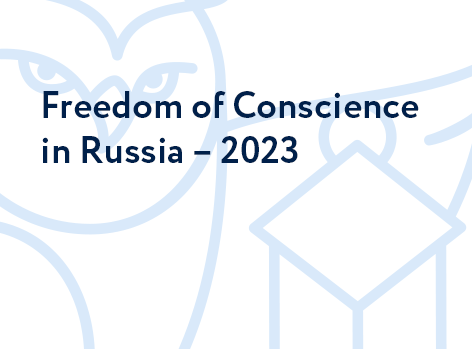SOVA Center for Information and Analysis took part in the 2022 OSCE Warsaw Human Dimension Conference (September 27 – October 7). Here we publish the report made by the center’s expert Olga Sibireva at the Plenary Session II "Fundamental freedoms I" on September 28.
Dear participants of the conference,
today I would like to highlight some problems concerning freedom of conscience that have arisen in Russia over the course of the last two years.
1. Russian legislation contains the concept of an "undesirable foreign organization". Any organization may be declared as undesirable without trial or any specific charges. At the same time, any cooperation with such an organization is punishable in Russia. In 2021, the Prosecutor General's Office of the Russian Federation designated the activities in Russia of the following religious organizations undesirable: four religious organizations of the New Generation Church, operating in Latvia and Ukraine, and two American organizations of the Church of Scientology.
These decisions in themselves pose a threat to religious freedom. Several dozen Russian Pentecostals have already been punished for participating in a pastors’ conference held last December in the vicinity of Moscow. A criminal case has already been opened on participation in the activities of an undesirable organization. Searches related to this case affected more than just the New Generation churches followers. For example, a Pentecostal pastor Nikolai Ulitin, who does not belong to this church, was arrested in Moscow.
2. The use of Article 239 of the Criminal Code on the creation of a non-profit organization, which infringes on the personality and rights of citizens, against followers of various religious associations has become more frequent. Several cases were opened under this article against evangelical Christians. In September, a Novosibirsk court started hearings against Church of the Last Testament, whose leaders are being charged with article 239, among others, and have been in custody for two years, one of them complaining of torture.
3. In October 2021, the Supreme Court ruled that when a religious organization is banned as extremist, the religious activity of believers is not in itself a crime. Regrettably, only a couple of trials acquitted believers on the basis of this ruling. Repressions against a number of religious associations continue. This concerns, for example, Muslims - followers of Said Nursi, members of the Tablighi Jamaat movement, and others. But Jehovah's Witnesses are being subjected to the harshest repressions. At the same time, imprisonment is being used more and more often. According to Jehovah's Witnesses themselves, in the five years since the ban, more than 600 people have been prosecuted in such trials. As of mid-September, 97 Jehovah's Witnesses were behind bars (in colonies and pre-trial detention centers).
4. Systematic pressure on religious minorities by the authorities has inevitably led to an increase in "anti-sectarian" rhetoric in the mass media. Defamatory materials about Protestant organizations and new religious movements appear more frequently in both federal and regional mass media, without the slightest administrative sanctions or public censure.
5. Religious texts continue to be banned as extremist. In 2022, the list of such banned texts includes, once again, Russian translations of the most valued Islamic texts of the 15th century, such as the hadith collection Sahih al-Bukhari.
We call on the Russian authorities to do the following:
- Stop the use of the concept of "undesirable organization", including against religious associations.
- Stop banning books and other materials as extremist, including religious.
- Repeal the discriminatory decision to ban organizations of Jehovah's Witnesses and abandon the practice of persecuting its followers for their faith.
- Reconsider other decisions banning religious associations as extremist.
- Rescind the "anti-missionary" amendments from the Yarovaya package that restrict the constitutional right to disseminate religious beliefs.
- Reconsider the policy on Protestant organizations and new religious movements in general, since the existing legitimization of "anti-sectarian" sentiment does not only contradict the principle of freedom of conscience, but also threatens public security and safety.

